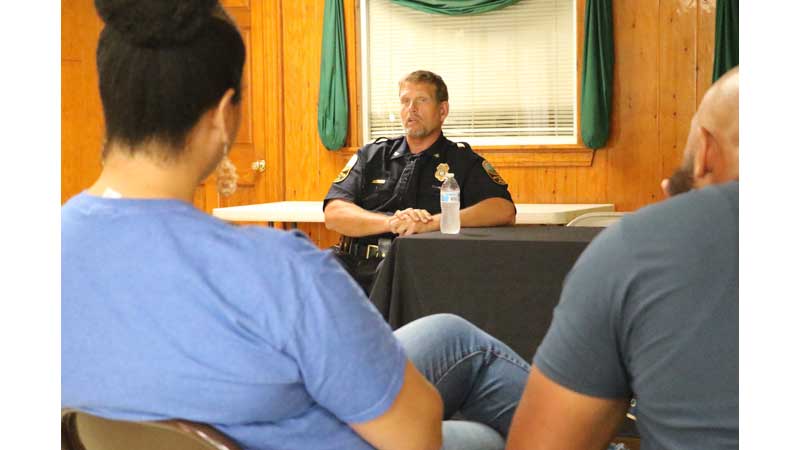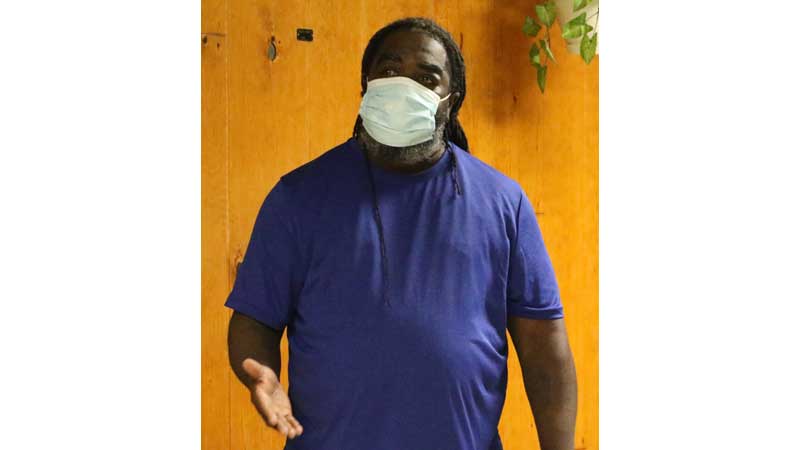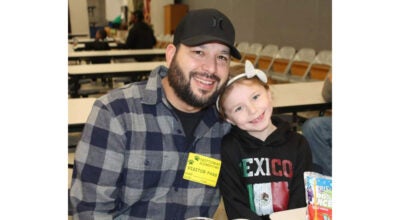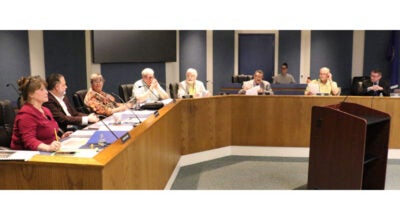Citizens seek proactivity in stopping gun violence
Published 4:42 am Thursday, June 3, 2021
|
Getting your Trinity Audio player ready...
|
An event designed to give citizens the opportunity to voice their opinions and concerns directly with Franklin Police Chief Steve Patterson on May 26 led to discussion on a wide array of topics, including gun violence in the city and what to do about it.
Organized by community member Jesse Evans, the event, called “Chilling with the Chief,” drew approximately 29 citizens, including multiple City Council members, and lasted for more than an hour-and-a-half at the Franklin Sportsman’s Association.
After Patterson gave an introduction and gave some insight into the limitations his department operates with, the floor was opened for questions.
Patterson was asked what the community can do to help the police, and he said, “If you see something, say something.”
He encouraged people to share any leads or tips they may have with the police, because he noted that people will often not talk, even though they know details.
After a variety of questions were asked, Evans spoke up about his main reason for organizing the event.
“My whole purpose of this was because we all know — basically that live on this side of town, the whole Franklin city — we have a major gun violence problem, and it seems like instead of it getting better, it’s getting worse,” he said.
He pointed out that there is a line of thinking present in the community that says, “I don’t want to be a snitch.”
“Well, guess what, some people don’t feel affected until it actually hits their house, then they want everybody to say something,” he said. “But that’s the wrong way to be. We all live in Franklin. Franklin is where we all live. Like the chief said, when you see something, say something. That’s the only way it’s going to get better.”
Patterson was asked about crime hot spots in the city and what the police department does about them, and he said his department does increased foot patrols, ride patrols and officers get out and talk to people.
When asked if those measures were helping, Patterson said there have been instances where shortly after officers leave the area, shootings occur.
Citizens at the meeting advocated for the installation of cameras in crime hot spots to serve as deterrents.
When Patterson was asked about installing cameras on street lights in hot spots, he pointed to money as being a key part of that.
“I can tell you that I have looked at a company that can bring a camera system, and it’s in the neighborhood of $120,000,” he said, suggesting that might be equivalent to a 3-cent tax rate increase.
There was discussion about the police department adding precincts.
Evans brought up the possibility of talking to City Council about having something like a precinct in a hot spot area.
“What would it take for us citizens to approach City Council to get something going in that area?” he said.
He was encouraged to appear at City Council meetings and to be proactive, speaking during citizens’ time at the meetings.
This is a point that Evans took to heart and reiterated to those present at the end of the May 26 community meeting.
“At the end of the day, even though we have (Patterson) here, giving him our concerns, we’ve got to go to that City Council,” he said. “There’s where we’ve got to go. We can sit here, and this is important, that’s why I wanted to come here. But the big picture is we need to go to City Council. I don’t mean just one person, one time. We’ve got to go, go go, go. We can’t just keep sitting back, because at the end of the day, this is our town. Nobody’s going to get it done but us.”
He said he and fellow citizens cannot just keep sitting at their kitchen tables, chattering about the gun violence problem with only their neighbors.
“Nothing’s going to get done there,” he said. “Your neighbor can’t change it. Only City Council can change it, and they can’t change it unless they hear your voice.”
Among the other topics discussed, Patterson was asked if Franklin Police Department has learned de-escalation techniques, and he said that officers receive a lot of that training in police academy, and his department has done implicit bias training.
“Also, a lot of the police reform measures (that) have come in are requiring annual training on de-escalation, implicit bias, all that kind of stuff,” he said. “So there is a lot of training related to that.”
He added that all officers go through mental health first aid training, and then as staffing allows, his department tries to send officers to crisis intervention training, which is a week-long school that delves more into handling people in crisis to try to prevent uses of force or injury.
“We also do body cam reviews,” he said, supervising his officers’ behavior on duty. “And if they do something wrong, we hold them accountable.”
Patterson noted he does not have a formal internal affairs department, which conducts investigations of the police.
“I don’t, because I’m internal affairs, my deputy chief’s internal affairs,” he said. “Any supervisor in the police department that’s not involved in the allegation is in internal affairs. We do internal affairs investigations on our own people. I’ve demoted people since I’ve been here, I’ve disciplined people since I’ve been here as late as yesterday as a matter of fact.”
He said that at the end of the day, “if we don’t police our own, then I can’t build trust with you that I’m going to take care of something when it happens. We’ve got to do that. We have no choice.”
When asked if he felt it would be feasible to have a separate internal affairs department, Patterson said there are not enough complaints to justify it.
He then was asked if he would be in favor of a citizen review board.
“Depends on what the power of the citizen review board is,” he said. “The state code gives it a lot of different angles. I worry when it starts getting into budgetary issues, because that is one of the things they can look at.”
Moments later he added, “To be honest with you, what really worries me is, some of the agencies around here have tried it, and it’s failed miserably so far.”
He said he worries prospective officers for Franklin will simply go to another department in the area when they learn they would have to go through a citizen review board in Franklin, hurting recruitment efforts that are an ever-present challenge.







